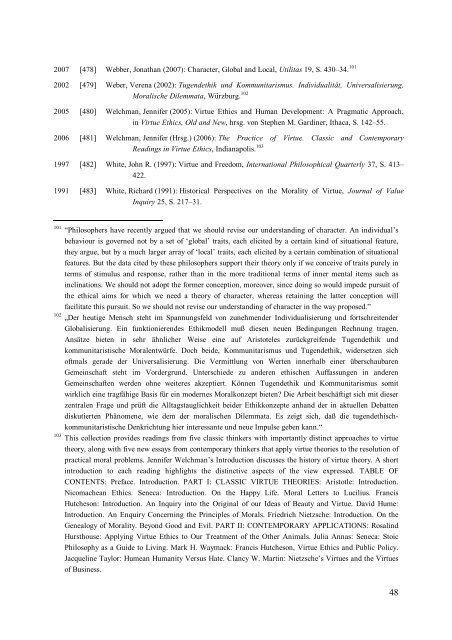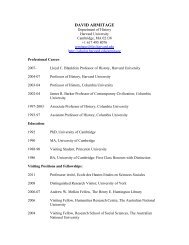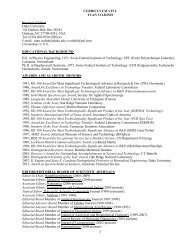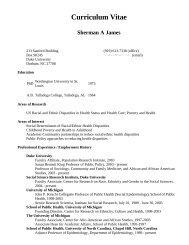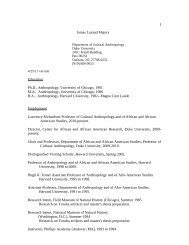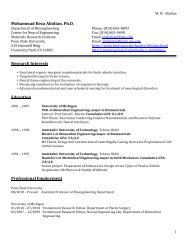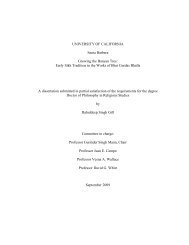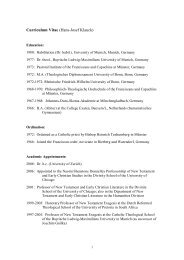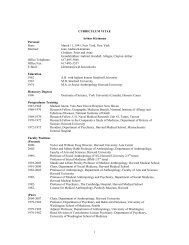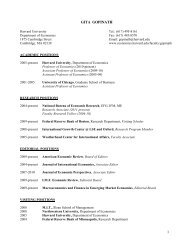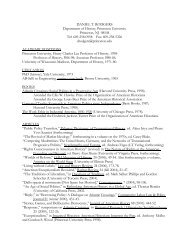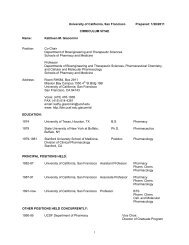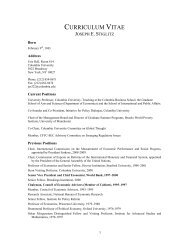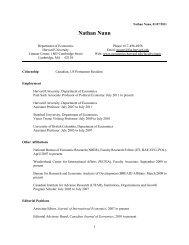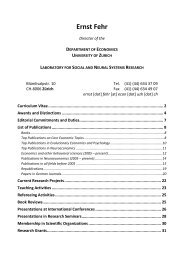Literatur zur Tugendethik Bibliography on Virtue ... - Academic Room
Literatur zur Tugendethik Bibliography on Virtue ... - Academic Room
Literatur zur Tugendethik Bibliography on Virtue ... - Academic Room
- No tags were found...
Create successful ePaper yourself
Turn your PDF publications into a flip-book with our unique Google optimized e-Paper software.
2007 [478] Webber, J<strong>on</strong>athan (2007): Character, Global and Local, Utilitas 19, S. 430–34. 1012002 [479] Weber, Verena (2002): <str<strong>on</strong>g>Tugendethik</str<strong>on</strong>g> und Kommunitarismus. Individualität, Universalisierung,Moralische Dilemmata, Würzburg. 1022005 [480] Welchman, Jennifer (2005): <strong>Virtue</strong> Ethics and Human Development: A Pragmatic Approach,in <strong>Virtue</strong> Ethics, Old and New, hrsg. v<strong>on</strong> Stephen M. Gardiner, Ithaca, S. 142–55.2006 [481] Welchman, Jennifer (Hrsg.) (2006): The Practice of <strong>Virtue</strong>. Classic and C<strong>on</strong>temporaryReadings in <strong>Virtue</strong> Ethics, Indianapolis. 1031997 [482] White, John R. (1997): <strong>Virtue</strong> and Freedom, Internati<strong>on</strong>al Philosophical Quarterly 37, S. 413–422.1991 [483] White, Richard (1991): Historical Perspectives <strong>on</strong> the Morality of <strong>Virtue</strong>, Journal of ValueInquiry 25, S. 217–31.101 “Philosophers have recently argued that we should revise our understanding of character. An individual’sbehaviour is governed not by a set of ‘global’ traits, each elicited by a certain kind of situati<strong>on</strong>al feature,they argue, but by a much larger array of ‘local’ traits, each elicited by a certain combinati<strong>on</strong> of situati<strong>on</strong>alfeatures. But the data cited by these philosophers support their theory <strong>on</strong>ly if we c<strong>on</strong>ceive of traits purely interms of stimulus and resp<strong>on</strong>se, rather than in the more traditi<strong>on</strong>al terms of inner mental items such asinclinati<strong>on</strong>s. We should not adopt the former c<strong>on</strong>cepti<strong>on</strong>, moreover, since doing so would impede pursuit ofthe ethical aims for which we need a theory of character, whereas retaining the latter c<strong>on</strong>cepti<strong>on</strong> willfacilitate this pursuit. So we should not revise our understanding of character in the way proposed.”102 „Der heutige Mensch steht im Spannungsfeld v<strong>on</strong> zunehmender Individualisierung und fortschreitenderGlobalisierung. Ein funkti<strong>on</strong>ierendes Ethikmodell muß diesen neuen Bedingungen Rechnung tragen.Ansätze bieten in sehr ähnlicher Weise eine auf Aristoteles <str<strong>on</strong>g>zur</str<strong>on</strong>g>ückgreifende <str<strong>on</strong>g>Tugendethik</str<strong>on</strong>g> undkommunitaristische Moralentwürfe. Doch beide, Kommunitarismus und <str<strong>on</strong>g>Tugendethik</str<strong>on</strong>g>, widersetzen sichoftmals gerade der Universalisierung. Die Vermittlung v<strong>on</strong> Werten innerhalb einer überschaubarenGemeinschaft steht im Vordergrund. Unterschiede zu anderen ethischen Auffassungen in anderenGemeinschaften werden ohne weiteres akzeptiert. Können <str<strong>on</strong>g>Tugendethik</str<strong>on</strong>g> und Kommunitarismus somitwirklich eine tragfähige Basis für ein modernes Moralk<strong>on</strong>zept bieten? Die Arbeit beschäftigt sich mit dieserzentralen Frage und prüft die Alltagstauglichkeit beider Ethikk<strong>on</strong>zepte anhand der in aktuellen Debattendiskutierten Phänomene, wie dem der moralischen Dilemmata. Es zeigt sich, daß die tugendethischkommunitaristischeDenkrichtung hier interessante und neue Impulse geben kann.“103 This collecti<strong>on</strong> provides readings from five classic thinkers with importantly distinct approaches to virtuetheory, al<strong>on</strong>g with five new essays from c<strong>on</strong>temporary thinkers that apply virtue theories to the resoluti<strong>on</strong> ofpractical moral problems. Jennifer Welchman’s Introducti<strong>on</strong> discusses the history of virtue theory. A shortintroducti<strong>on</strong> to each reading highlights the distinctive aspects of the view expressed. TABLE OFCONTENTS: Preface. Introducti<strong>on</strong>. PART I: CLASSIC VIRTUE THEORIES: Aristotle: Introducti<strong>on</strong>.Nicomachean Ethics. Seneca: Introducti<strong>on</strong>. On the Happy Life. Moral Letters to Lucilius. FrancisHutches<strong>on</strong>: Introducti<strong>on</strong>. An Inquiry into the Original of our Ideas of Beauty and <strong>Virtue</strong>. David Hume:Introducti<strong>on</strong>. An Enquiry C<strong>on</strong>cerning the Principles of Morals. Friedrich Nietzsche: Introducti<strong>on</strong>. On theGenealogy of Morality. Bey<strong>on</strong>d Good and Evil. PART II: CONTEMPORARY APPLICATIONS: RosalindHursthouse: Applying <strong>Virtue</strong> Ethics to Our Treatment of the Other Animals. Julia Annas: Seneca: StoicPhilosophy as a Guide to Living. Mark H. Waymack: Francis Hutches<strong>on</strong>, <strong>Virtue</strong> Ethics and Public Policy.Jacqueline Taylor: Humean Humanity Versus Hate. Clancy W. Martin: Nietzsche’s <strong>Virtue</strong>s and the <strong>Virtue</strong>sof Business.48


